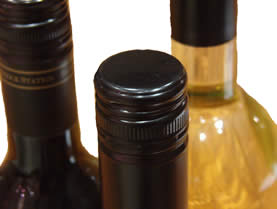|
Boring
wine
 Want
to feel depressed? Then you should attend a press tasting put on by a
British supermarket (Waitrose and perhaps M&S excepted). It’s a
thoroughly soul destroying experience if you actually care about wine.
Bottle after bottle of fruity, slightly neutral white, perhaps with
just a touch of residual sugar. All tasting exactly the same. A
similar story for the reds, with bright, fruity, inoffensive flavours,
the odd one rounded out with a trace of residual sugar or some subtle
oak ‘influence’. Want
to feel depressed? Then you should attend a press tasting put on by a
British supermarket (Waitrose and perhaps M&S excepted). It’s a
thoroughly soul destroying experience if you actually care about wine.
Bottle after bottle of fruity, slightly neutral white, perhaps with
just a touch of residual sugar. All tasting exactly the same. A
similar story for the reds, with bright, fruity, inoffensive flavours,
the odd one rounded out with a trace of residual sugar or some subtle
oak ‘influence’.
The supermarkets deserve some credit for the work they have
done popularising wine in the UK, but now they’re slowly killing the
sector they once helped develop. With their penchant for clean,
characterless, taste-alike fruity wines, the result is they’ve
filled their shelves with bottles where the only substantive
difference lies in the price tag. Thus, the pressure is ever downwards
on price points, with no sign of abating. Many branded Australian
wines are selling for the same price they were in 1993, when I first
started drinking wine. I remember Lindemans Bin 65 used to go for £4.99
around that time, 10 years ago. While Lindemans have raised its retail
price to £5.99, you can still buy it for £4.99, or even less,
because now deep discounting is the way that these sorts of wines are
sold.
The supermarkets are the place to go if you want boring,
boring wine. Yes, they window dress with some higher priced wines. As
a treat (and a bit of fun) my wife bought me the most expensive bottle
in our local Tesco branch. It was a Gevrey Chambertin selling at £18.
And it was crap. Mediocre negociant rubbish that I wouldn’t
recommend at half the price. In the classic old world regions the best
wines are made in relatively small quantities and are highly sought
after. You aren’t going to find decent Burgundy in your local
supermarket. You’ll be lucky if you find drinkable Burgundy.
The supermarket wine buyers are smart people with good
palates. The people in charge of the Beers, Wines and Spirits
departments are also smart: they aren’t bad people who treat their
children and animals cruelly. No, they are doing, from their
shareholders’ perspective, a good job. They are buying low, whacking
a decent margin on, and selling commercial wine for a good profit. But
in doing this, they are damaging the sector. No one has yet found a
clever way to market wine to the masses other than on the grounds of
price. The people who suffer, ultimately, from this practice are the
producers. They need the access to market that the supermarkets offer
more than the supermarkets need them. And of course, the consumers:
they are being left with boring wine and an illusion of choice.
As I’ve mentioned elsewhere,
the consumers aren’t just being let down by the large retailers. The
critics in the UK are also failing their readers by continuing to be
besotted by these boring supermarket wines. They are trapped by the
commercial edifice; stuck as they are feeding off the crumbs that fall
from its table. A collusion. Accidental, no doubt.
But it’s not just cheap wines that taste the same these
days. Ambitious producers the world over are being misled to make
wines in an international style. These are red wines that through
heavy winemaking influence, betray their ‘terroirs’: they lack any
regional or local identity of the sort that makes fine wine so
interesting. The formula? Lower yields, perhaps excessively. Leave the
grapes to achieve super-physiological ripeness. Extend the maceration
and extract as much as possible. Use cultured yeasts. Rack off into
new oak for malolactic fermentation. Complete elevage in new oak for
18 months. None of these practices in themselves is bad, but applied
as the well paid consultant directs without any thought for preserving
typicity or terroir results in wines that taste sort of international,
and a little bit boring.
But I’m not depressed; I’m actually quite optimistic.
For every producer making boring international wines there’s one or
more making fascinating, characterful ones. For every dull supermarket
range, there are half a dozen enthusiastic independents with cleverly
chosen ranges. There is interesting wine out there, and I see my
mission to seek it out and tell you about it. But, knowing the sorts
of people that tend to visit this site, you probably know already!
Back to top
|

